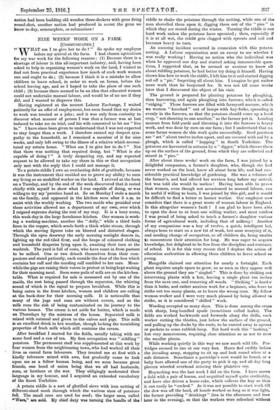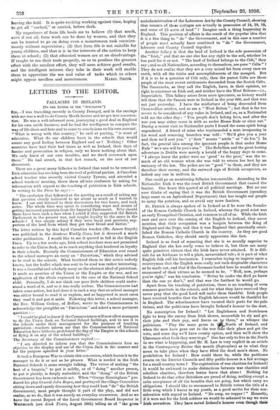NINE WEEKS' WORK ON A FARM.
[COMMUNICATED.]
!‘ WHAT am I to give her to do ? " So spoke my employer
before my arrival at the farm. I had chosen agriculture for my war work for the following reasons : (1) Because there is a shortage of labour in this all-important industry, and, having been asked to help in organizing women's work on the land, I wished to find out from practical experience how much of such work women can and ought to do ; (2) because I think it is a mistake to allow children to leave school, in order to work on farms, before the school leaving age, and so I hoped to take the place of one such child ; (3) because there seemed to be an idea that educated women could not undertake manual labour, and would be of no use if they did, and I wanted to disprove this.
Having registered at the nearest Labour Exchange, I waited patiently for an offer of employment, but soon found that my desire to work was treated as a joke; and it was only from curiosity to discover what manner of person I was that a farmer was at last induced to take me on trial, and his wife consented to let me " live in." I have since been given to understand that I was not expected to stay longer than a week. I therefore extend my deepest sym- pathy to the household, as I remained a member of it for nine weeks, and only left owing to the illness of a relative which necessi- tated my return home. " What am Ito give her to do ? " Not that there was nothing that required doing, but " What is she capable of doing ? " A truly despairing cry, and my repeated request to be allowed to take my share in this or that occupation only met with the reply that I could not manage it.
To a potato riddle I owe an everlasting debt of gratitude, because
it was the instrument that enabled me to prove my ability to earn my living as an unskilled worker on the land. I arrived at the farm on a Tuesday, and by the end of the week discovered that it rested chiefly with myself to show what I was capable of doing, or was willing to try my 'prentice hand at. So on Monday I stole a march on the family, and appeared in the kitchen soon after 5 a.m. to assist with the weekly washing. The two maids who presided over these activities allowed me a department of my own, over which I reigned supreme during the rest of my stay. It is a busy scene, this wash-day in the large farmhouse kitchen. One woman is work- ing a washing-machine, another the " dolly," while a third boils linen in the copper, which sends forth a thick white steam, through which the moving figures take on blurred and distorted shapes. Through the open doorway the early morning sunlight dances in, lighting up the red-tiled floor, and the heaps of coloured clothing and household draperies lying upon it, awaiting their turn at the washtub. The yard is full of cows, who have come in from pasture to be milked. One or two detach themselves from their com- panions and stand patiently, each outside the door of the box which contains her calf and the nursling calf confided to her care. Mean- while the pigs are raising their voices in protest at being kept waiting for their morning meal. Soon some pails of milk are on the kitchen- table. What is required for sale is measured out by one of the maids, the rest being passed through the separator, the whirring sound of which is the signal to prepare breakfast. While this is being eaten in the front kitchen, women and children are calling at the back-door for their morning milk. It is noticeable that many of the jugs and cans are without covers, and so the milk runs the risk of being contaminated on its journey to the various houses. The cream is set aside for butter, which is made on Thursdays by the mistress of the house. Separated milk is mixed with oatmeal and given to the calves and pigs. This milk is an excellent drink in hot weather, though lacking the nourishing properties of fresh milk which still contains the cream.
After breakfast I started for the fields, usually taking with me some food and a can of tea. My first occupation was " riddling " potatoes. The permanent staff was supplemented at this work by four women from the neighbouring town, who had worked all their lives as casual farm labourers. They treated me at first with a kindly tolerance mixed with awe, but gradually came to look upon me as a fellow human being, and we soon became great Mends, one bond of union being that we all had husbands, sons, or brothers at the war. They obligingly moderated their language in my honour, and I acquired an extended vocabulary of the finest Yorkshire.
A potato riddle is a sort of glorified sieve with iron netting of different-sized mesh through which the various sizes of potatoes fail The small ones are used for seed; the larger ones, called "Ware," are sold. My chief duty was turning the handle of the riddle to shake the potatoes through the netting, while one of the men shovelled them upon it, digging them out of the " pies " in which they are stored during the winter. Turning the riddle is not hard work unless the potatoes have sprouted ; then, especially if it is at all wet, the riddl8 gets clogged with sprouts and soil and becomes heavy to turn.
An amusing incident occurred in connexion with this potato- sorting. A Labour organization sent an envoy to see whether I was really working I Having no notion who the individual was when he appeared one day and started asking innumerable ques- tions, I suggested that, as he seemed so anxious to know all about riddling potatoes, he had better try doing it himself. Having shown him how to work the riddle, I left him to it and started digging soil off a "pie," forgetting all about him. I imagine he got rather more work than he bargained for. It was not till some weeks later that I discovered the object of his visit.
The ground is prepared for planting potatoes by ploughing. then harrowing, and again ploughing into furrows, which is called "ridging." These furrows are filled with farmyard manure, which we women " knocked " out of lumps with hay-forks, spreading it evenly in the furrows, so that the potatoes should come up a level crop, " not shouting to one another," as the farmer put it. Loading manure from fold-yards and throwing it into the furrows is heavy work, and was done by men on our farm ; but I understand that on some farms women do this work quite successfully. Seed potato we are " set " about twelve inches apart, and are covered with soil by a plough, which is called " happing " in South Yorkshire. The potatoes are harvested in autumn by a " digger," which throws thorn up on the surface of the ground, from which they are collected and stored in " pies."
After about three weeks' work on the farm, I was joined by a delightful companion, a farmer's daughter, who, though she had never worked on the land, knew all about farm life, and had con- siderable practical knowledge of gardening. She was a relation of the farmer's, and had offered her services long before my arrival, but was told she would be useless ! Having been able to prove that women, even though not accustomed to manual labour, can be useful if willing to learn, I was joined by this girl, and it would be difficult to find a better or keener worker. Our employer now considers that there is a great waste of woman labour in England. Is this altogether women's fault ? I am glad to have been able to open the door to at least one willing worker, and must confess I was proud of being asked to teach a farmer's daughter various forms of agricultural work, including that of milking ! Another of my companions was a boy of twelve, a quick, intelligent lad, always keen to start on a new bit of work, but soon wearying of it, and needing change of occupation, as all children do, being unable to concentrate their attention for long. He was eager to acquire knowledge, but delighted to be free from the discipline and restraint of school It is for this very reason that I deplore the action of education authorities in allowing these children to leave school so young.
Mangolds claimed our attention for nearly a fortnight. Each plant requires ample space to grow, so as soon as they appear well above the ground they are " singled." This is done by striking out intervening plants with a hoe, leaving a single plant ten inches from the next one, and removing all weeds. " Striking " is harder than it looks, and rather anxious work for a beginner, who fears to strike out too many plants, or to leave the wrong ones. My fellow woman-worker and I were very much pleased by being allowed to strike, as it is considered " skilled " work.
Weeding occupied us many days. This is done among the crops with sharp, long-handled spuds (sometimes called lauks). The fields are worked backwards and forwards along the drills, each worker cutting the thistles, just below the surface of the ground, and pulling up the docks by the roots, to be carried away in aprons or pockets to some rubbish-heap. Not hard work this " hulking," but very monotonous, requiring close attention so as not to miss the smaller plants.
While working quietly in this way we saw much wild life. Par- tridges seemed to rise at our very feet. Hares fled swiftly before the invading army, stopping to sit up and look round when at a safe distance. Sometimes a partridge's nest would be found, or a baby hare allowed one of the party to pick it up, and all day long plovers wheeled overhead uttering their plaintive cry.
Haymaking was the last work I did on the farm. I have mown a field with a pair of horses, and acquitted myself quite creditably,
and have also driven a horse-rake, which collects the hay so that it can easily be "cocked." As it was not possible to start work till the dew was off the land, all hands worked as long as it was light, the farmer providing " drinkings " (tea in the afternoon and beer later in the evening), so that the workers were refreshed without leaving the field. It is quite exciting working against time, hoping to get all " cocked," or carried, before dark.
My experience of farm life leads me to believe (I) that much, even if not all, farm work can be done by women, and that they can be trusted to go on doing even a monotonous task conscien- tiously without supervision ; (2) that farm life is not suitable for young children, and that it is in the interests of the nation to keep them at school ; (3) that educated women are at no disadvantage. If taught to use their tools properly, so as to produce the greatest effect with the smallest effort, they will soon achieve good results, and the intelligent interest they take in their work will enable them to appreciate the use and value of tasks which to others might appear needless and monotonous. MABEL SMITH.



































 Previous page
Previous page